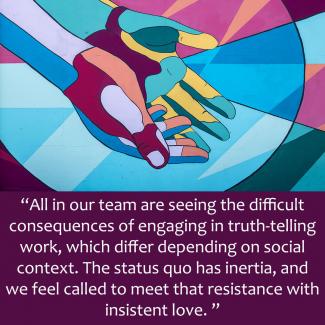A reflection from the Racial Justice Commission's Subcommittee on Accountable Structures and Practices, spotlighting its priorities and progress
Structures are enduring features of an organization, and our subcommittee is working to identify racial biases in the unquestioned assumptions that guide our hiring, retention (who stays and who leaves), evaluation (how we assess performance) and accountability processes (how we manage mistakes) in our governance (whose voices are heard, what the priorities are) and even in our culture and identities (who we think we are).
Seeing and acknowledging these biases is an important first step toward becoming a truly Beloved Community. We hope to share what we learn for a broader awareness across the diocese and facilitate a collective conversation in which we decide that it matters enough to make structural changes to our system.
Since March 2021, our small, diverse subcommittee has been getting to know and trust one another and developing a statement of work for the first phase of the work--outlining the approach to understanding the current bias in the aforementioned structures. We are building on recent similar work in the diocese and the wider Episcopal Church, and plan a generative approach with diverse paths available to share data and stories about where we are called to improve.
What we're learning: The white people on our subcommittee are committed to this justice and healing work, and yet are aware of how much they have to learn in order to be engaged in appropriate ways. We are hearing personal stories of oppression and hurt, those usually damped down by white privilege and the dominant culture firmly in place in our diocesan communities. This work often feels uncomfortable, but it is a good discomfort of expanding our understanding and deepening our commitment. All in our team are seeing the difficult consequences of engaging in truth-telling work, which differ depending on social context. The status quo has inertia, and we feel called to meet that resistance with insistent love.
Reflection: Some possible questions for communities and congregations considering next steps:
1. Where in the processes mentioned above have we seen white supremacy operating in our community? Are we willing to learn, acknowledge our history and reconcile?
2. Are we open to expanding our identity as a church, even if it calls for a personal transformation that encompasses mind, body and spirit? There are many paths, but it will take more than one workshop.
3. Are we interested in working with the Subcommittee on Accountable Structures and Practices to understand how "business as usual" in our congregations is falling short?
4. Healing needs to happen in tandem with uncomfortable conversations, and that healing looks different for different affinity groups. Who needs to be included in our multifaceted healing process?
5. The work of dismantling white supremacy and establishing an antiracist church is a commitment. Are our leaders ready to invest time and money to accomplish this goal? If so, please contact the co-chairs, listed below.
Racial Justice Commission Subcommittee on Accountable Structures and Practices:
Co-Chairs:
Zena Link (St. Luke's Church, Worcester and Mission Institute): atl029@mail.harvard.edu
Kris Wile (St. Elizabeth's Church, Sudbury): kwile@stcollab.com
Members: Helen Patmon (St. Stephen's Church, Lynn), Grace Clark (Trinity Church, Boston), The Rev. Canon Martha Hubbard, Regional Canon for Northern and Western Region
Mandate: Work with diocesan staff to create accountable and transparent structures in our diocese and in Episcopal congregations and communities. This includes (but is not limited to) hiring practices, committee make-up, search committee processes and vestry business practices.
Photo by Tim Mossholder on Unsplash

